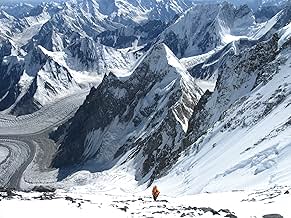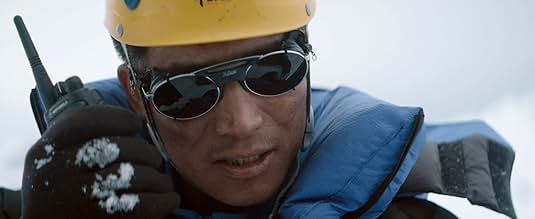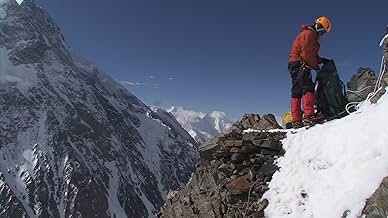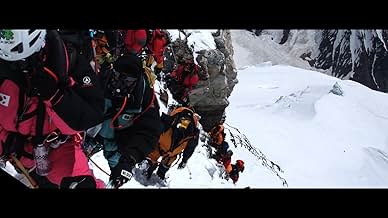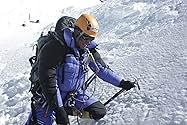VALUTAZIONE IMDb
6,8/10
5624
LA TUA VALUTAZIONE
Aggiungi una trama nella tua linguaThe story of the deadliest day on the world's most dangerous mountain, when 11 climbers mysteriously perished on K2.The story of the deadliest day on the world's most dangerous mountain, when 11 climbers mysteriously perished on K2.The story of the deadliest day on the world's most dangerous mountain, when 11 climbers mysteriously perished on K2.
- Regia
- Sceneggiatura
- Star
- Premi
- 3 vittorie e 5 candidature totali
Walter Bonatti
- Self
- (filmato d'archivio)
Gerard McDonnell
- Self - Climber
- (filmato d'archivio)
Hristo Mitzkov
- Marco Confortola
- (as Christo Mitzkov)
Lochlann O'Mearáin
- Ger McDonnell
- (as Lochlainn O'Mearain)
Recensioni in evidenza
Can somebody enlighten me about the directors ideas to cut the material as he did? 30 min in we are in newspaper clippings after the 'accident'/incident and feelings of friends of mountaineers. 5 min later we rewind to 3 months before.
the attempt to introduce the characters and tell the story seemed a bit too much of an endeavour.
i am really sad about this... very unsatisfying, this could have been a stellar piece of documentary.
the attempt to introduce the characters and tell the story seemed a bit too much of an endeavour.
i am really sad about this... very unsatisfying, this could have been a stellar piece of documentary.
"He discovers things about his own body and mind that he had almost forgotten in the day-to-day, year-to-year routine of living." James Ramsey Ullman, High Conquest.
I don't know about you, but if I were approaching the "death zone" while mountain climbing, I'd turn back. However, you can bet the heroes of the documentary, The Summit, hiking the world's second biggest and most difficult mountain (it defeats 1 out of every 4 climbers), K2, had no such thoughts. The Summit won the Sundance World Cinema documentary award this year.
More interesting than the physical exploits is the rationale for doing such a dangerous sport in the first place. Yet, such psychoanalyzing is not a matter for The Summit, a thrilling doc long on the difficult climb and more difficult decisions while fates are decided in sometimes inscrutable and random ways. It's short on the motivation, which pretty much is accepted these days as, "because it's there."
Eleven climbers of 25 lost their lives that day in 2008 without an adequate explanation for any of the deaths. However this thesis is proved once more: Most lives in climbing are lost on the descent. The film has a fragmented, multiple-points-of-view (think of a climbing Rashomon) approach that cuts among the several players and history while featuring a couple of the more charismatic climbers, especially Ger McDonnell, whose death is the most difficult to understand even as he's touted for his alleged attempt to save 3 Korean climbers.
This discursive storytelling can be confusing while it saps the thrust of the inherently intriguing story. The many re-enactments drain the film of its immediate "what-the" doc impact. The film retains some of the awe we all feel when in the presence of such a manifestation of Nature's power:
"You do not laugh when you look at the mountains, or when you look at the sea." Lafcadio Hearn
I don't know about you, but if I were approaching the "death zone" while mountain climbing, I'd turn back. However, you can bet the heroes of the documentary, The Summit, hiking the world's second biggest and most difficult mountain (it defeats 1 out of every 4 climbers), K2, had no such thoughts. The Summit won the Sundance World Cinema documentary award this year.
More interesting than the physical exploits is the rationale for doing such a dangerous sport in the first place. Yet, such psychoanalyzing is not a matter for The Summit, a thrilling doc long on the difficult climb and more difficult decisions while fates are decided in sometimes inscrutable and random ways. It's short on the motivation, which pretty much is accepted these days as, "because it's there."
Eleven climbers of 25 lost their lives that day in 2008 without an adequate explanation for any of the deaths. However this thesis is proved once more: Most lives in climbing are lost on the descent. The film has a fragmented, multiple-points-of-view (think of a climbing Rashomon) approach that cuts among the several players and history while featuring a couple of the more charismatic climbers, especially Ger McDonnell, whose death is the most difficult to understand even as he's touted for his alleged attempt to save 3 Korean climbers.
This discursive storytelling can be confusing while it saps the thrust of the inherently intriguing story. The many re-enactments drain the film of its immediate "what-the" doc impact. The film retains some of the awe we all feel when in the presence of such a manifestation of Nature's power:
"You do not laugh when you look at the mountains, or when you look at the sea." Lafcadio Hearn
Confusing and untrue at times. I had to read about what actually happened to find out the facts after 2 hours of poorly put together interviews. Also the Serbian climber was quite selfless and died because he unclipped to let other people pass him, not to pass Skog. I don't know why they would make such a strange mistake on this detail, but it's either deliberate lying to make the story better or poor research.
At 8 a.m. climbers were finally advancing through the Bottleneck. Dren Mandić, from the Serbian team, decided to attend to his oxygen system and so unclipped from the rope to let other climbers pass. Mandić lost his balance and fell, bumping into Cecilie Skog of the Norwegian team. She was still clipped to the rope and was only knocked over. Mandić fell over 100 m down the bottleneck.
At 8 a.m. climbers were finally advancing through the Bottleneck. Dren Mandić, from the Serbian team, decided to attend to his oxygen system and so unclipped from the rope to let other climbers pass. Mandić lost his balance and fell, bumping into Cecilie Skog of the Norwegian team. She was still clipped to the rope and was only knocked over. Mandić fell over 100 m down the bottleneck.
High-altitude mountaineering fascinates many people, this reviewer included, for the extreme demands it places on sportsmen engaged on the sport. They go to places where helicopters don't go, where no human could live for extended periods of time. Different than other extreme nature sports like rafting, cross-country skiing or long-distance trekking, mountaineering provides the only way for people to reach places that are higher above the rest of the World.
In this context, I generally like documentaries and docudramas that focus on various aspects of the sport, its challenges and also its tragedies.
However, The Summit covers a nice story on a confusing and haphazard edition. It combines real-time footage of events, 'debriefing'-style post-fact interviews and dramatization of events are accounted by those that survived or witnessed them first-hand. All that material should yield a great final piece, but I'm left with the feeling of watching an unfinished job, or a piece that was somehow the result of compromises of an intractable committee with diverging opinions on how the documentary should look like.
In this context, I generally like documentaries and docudramas that focus on various aspects of the sport, its challenges and also its tragedies.
However, The Summit covers a nice story on a confusing and haphazard edition. It combines real-time footage of events, 'debriefing'-style post-fact interviews and dramatization of events are accounted by those that survived or witnessed them first-hand. All that material should yield a great final piece, but I'm left with the feeling of watching an unfinished job, or a piece that was somehow the result of compromises of an intractable committee with diverging opinions on how the documentary should look like.
From what I understood, this documentary set out to answer a difficult moral dilemma: should a climber endanger his own life in order to save others'? I think it did a beautiful job at giving a rather complete picture of people's different perspectives, attitudes, projected against the outcome. It is probably one of the best documentaries that I have seen, in the sense that it manages to capture the gist of this issue.
On a more personal note, I really liked the comment that the widow of one of the perished climbers makes towards the end of the movie. It raises an interesting question "of judgment" for the people that are outside the climbing world.
On a more personal note, I really liked the comment that the widow of one of the perished climbers makes towards the end of the movie. It raises an interesting question "of judgment" for the people that are outside the climbing world.
Lo sapevi?
- QuizWon Best Feature film at 2013 BANFF film festival. The award was accepted on behalf of the film makers by Norwegian adventurer Cecilie Skog, who is featured in the film.
- Curiosità sui creditiThe title of the movie does not show until about 15 minutes into the film.
- ConnessioniReferenced in Film Junk Podcast: Episode 457: Nymphomaniac Vol. 1 and True Detective (2014)
I più visti
Accedi per valutare e creare un elenco di titoli salvati per ottenere consigli personalizzati
- How long is The Summit?Powered by Alexa
Dettagli
- Data di uscita
- Paesi di origine
- Siti ufficiali
- Lingue
- Celebre anche come
- The Summit
- Luoghi delle riprese
- K2, Karakoram Mountain Range, Pakistan(Aerial Sequences)
- Aziende produttrici
- Vedi altri crediti dell’azienda su IMDbPro
Botteghino
- Budget
- 1.000.000 USD (previsto)
- Lordo Stati Uniti e Canada
- 243.550 USD
- Fine settimana di apertura Stati Uniti e Canada
- 20.904 USD
- 6 ott 2013
- Lordo in tutto il mondo
- 277.651 USD
- Tempo di esecuzione
- 1h 35min(95 min)
- Colore
- Proporzioni
- 1.85 : 1
Contribuisci a questa pagina
Suggerisci una modifica o aggiungi i contenuti mancanti


